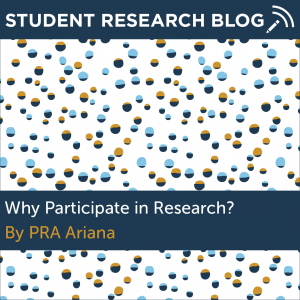By Ariana Rojas, OUR Peer Research Ambassador
Hearing about undergraduate research can be both exciting and intimidating. You may be asking yourself: What does undergraduate research look like? Can I get involved in research? Do I have to be an upperclassman to do it? Is it too late to start?
Undergraduate research was a completely foreign topic for me. I knew it existed, but I didn’t think it was feasible for me. And, when I realized that I could start undergraduate research, I was afraid that I was too late and already missed my chance to start, as a second semester sophomore. After I transferred from the Stamford campus, I felt like I was already behind. I knew what undergraduate research was in Stamford, but I didn’t think it was attainable. When I transferred to Storrs, I felt overwhelmed by the process. I almost didn’t even apply for my first position, and REU program, because I felt that I wasn’t qualified or accomplished enough to apply. Looking back, I am so happy that I took that first leap into research and I’m hoping to share with you how you can get involved too.
Why research?
Research is a unique experience. It allows you to engage with the world around you, ask questions, and find the answers to them. Through the majority of your schooling, you probably have just been presented with information without the opportunity to question what is in front of you and dive deeper. Research allows you to be creative and to explore a topic you’re interested in.
Why did I choose to get involved?
I originally wanted to get involved with research for two reasons: firstly, I was excited by the idea of being able to apply the concepts I was learning beyond the classroom lab. I knew that research was a whole other world of learning, one of which I thought I would thrive in because I like hands-on experience. I wanted to use research as a way to supplement my science education and creativity, and I’m so happy I’ve had wonderful opportunities that allowed me to do exactly that. Secondly, I wanted to be more creative within my field as well as in my life. I love working in science because it is fundamentally creative. To be a scientist is to question the world around you and in order to answer those questions you have to come up with creative solutions — research is the same way. In order to come up with questions and to be curious, you have to be creative.
What were my research goals and interests?
Before my first research project, my main interests were genetics and molecular mechanisms. Fundamentally, my research interests are still the same. But, I’ve narrowed them down to focus on questions pertaining to developmental biology. I’m mainly interested in understanding what molecular pathways and genes are involved in the development of all organisms. I want to understand the ancient mechanisms that created the world we see today.
What have I learned from engaging in research?
Research has been a fundamental part of my growth as a scientist, student, and person for the past year. When I first got involved with research during Summer 2019 I was a completely different person than I am right now. During that time, I learned important techniques that an undergraduate not involved in research may never get to learn, like how to operate a confocal microscope on my own or how to work comfortably under a dissecting microscope with extremely delicate organisms. I’ve also learned skills that transcend science. Some of those skills include programming languages such as bash and python, how to manipulate large amounts of data, and developing general writing and communication skills. Research has also taught me to be an advocate for myself and has given me confidence in my own expertise.
Ariana is a senior majoring in Molecular and Cell Biology with minors in Political Science and Environmental Studies. Click here to learn more about Ariana.